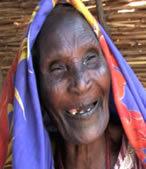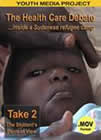How to Make an Old Man Cry
I was interviewing a group of older refugees under an acacia tree on the border of Sudan. When we were finished I thanked them for their patience and offered them the chance to turn the tables: “Do you have any questions for me?” 
“Are you married?” one woman immediately asked.
“No,” I said as I took apart my tripod.
“Do you have children?”
I shook my head.
“How old are you?”
“43.”
I finished wrapping up my microphone cables and looked up to see that everyone was crying. One old man sitting off to one side had tears streaming down his face. They were looking at me with utter pity, as though I had just been given a terminal diganosis.
“Well,” the first woman said after an awkward pause, “there’s an old man on the other side of camp.” She hesitated. “He only has three wives, so he can take one more....”
“You’re not fertile anymore,” her companion added brightly, “but he might still have you.”
Up until that moment I had been quite proud of myself – traveling alone halfway around the world, handling expensive camera gear, learning a foreign language. But in North Africa a woman is valued by the status of her husband and the number of her (male) children. It was a rare glimpse into a cultural mirror – a chance to see myself the way they saw me. And the realization that I have just as much to learn as the students who will one day get my footage.
The Video Diary Room
Last year a Florida teacher told me she had cleaned out a broom closet at her school and turned it into a “video diary” room so that her students could record their feelings about the documentary they were making. I thought this was a brilliant idea – and told her so - though I quailed at the thought of her having to transcribe what was sure to become hundreds of hours of teenage ramblings. I suggested that perhaps the students should transcribe their own diaries, but she was firm. She would do it herself
And she did. Evenings, weekends -  while brushing her teeth and cooking dinner. She sent me some real gems, including footage of one of her seniors doing amazing things with a yo-yo. She also spent her entire spring break having marathon post-production sessions at her house and ordering a steady stream of pizzas.
while brushing her teeth and cooking dinner. She sent me some real gems, including footage of one of her seniors doing amazing things with a yo-yo. She also spent her entire spring break having marathon post-production sessions at her house and ordering a steady stream of pizzas.
That must have been the hardest year of her teaching career. I don’t know how she did it.
Then, with three weeks to go before their premiere, she invited parents to come to the school for a sneak preview. No more than 20 parents had ever shown up for an event at this lower-income public school.
70 parents arrived that night, as well as board members and even principals from nearby schools. Afterwards the parents came up to her en masse and offered to do anything they could to help. Her own principal, who had been lukewarm to the idea at first, suggested that she teach two Take 2 classes the following semester.
In a world that tends to focus only on the things that are wrong with our education system, I’m here to tell you that our students are in good hands.
Making a Difference
Most of you are seasoned travelers. You read the papers: Global warming... Worldwide economic recession... Terrorism.... You wonder how our children will cope with the troubled world we will one day pass on to them.
This is your chance to give them the skills they need - critical thinking, leadership, media literacy, empathy and understanding - that will allow them not just to survive but to thrive in our increasingly connected global economy. Skills that will make America wiser and stronger. Skills that may one day avert another Rwandan genocide or a North Korean missile crisis.
But we have to start now. Global citizens aren't created overnight.
Andrew was 17 when he asked for footage to make a documentary on Sudan. I didn't hear from him for months, and when he finally sent me his finished project about Jeda, a young girl in the refugee camp, I was stunned. It was superb. Several film festivals accepted it, and he was invited to speak at a teachers' conference in New England. When it was over he sent me a letter that said, "when I first saw the footage, I couldn't understand life in the refugee camps. But by  the time I was done, I felt like Jeda was my friend."
the time I was done, I felt like Jeda was my friend."
One student. Making a difference to hundreds of lives.
So can you.
Please help us reach as many students as we can!
Your contribution is fully tax deductible and will go a long
way to turning teenagers into
global citizens.
Thank you!
“Some students stayed after school on Tuesday to work on the film. This morning they asked if they could stay every Tuesday through January to continue with the work. Imagine that — teenagers insisting on giving up their time to work on this!”
Teacher, Michigan

 throughout North America have the opportunity to edit National Geographic-quality raw footage to create their own documentaries and shorts. Take 2 is offering in-depth, professional footage that comes with a comprehensive curriculum and teaching tools that meet the state and national curricular standards for social studies, economics, government, science, media, or literature. Teachers do not need to have any video or editing skills – teaching tools are available in the supporting materials.
throughout North America have the opportunity to edit National Geographic-quality raw footage to create their own documentaries and shorts. Take 2 is offering in-depth, professional footage that comes with a comprehensive curriculum and teaching tools that meet the state and national curricular standards for social studies, economics, government, science, media, or literature. Teachers do not need to have any video or editing skills – teaching tools are available in the supporting materials. 